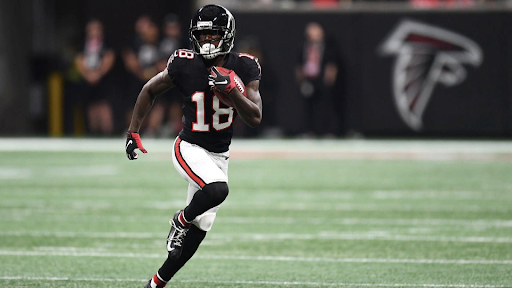
Falcons wide receiver Calvin Ridley’s recent suspension for placing bets, including on the Falcons themselves, exposes the current state of sports gambling. Photo courtesy of NBC Sports.
May 14, 2018: the Supreme Court is about to rule in the case of Murphy v. NCAA, whether or not New Jersey had the right to legalize sports gambling. In a 7–2 verdict, the court sided with New Jersey, opening the door to legal betting on the state level. This decision would change the trajectory of sports for the coming decade. As old concerns clash with new technologies and leagues scramble for revenue following a global pandemic, a central question emerges: does gambling threaten the integrity of the game?
We got an answer just this week after news broke that Atlanta Falcons wide receiver Calvin Ridley would be suspended for the entire 2022 season. This was after he placed multiple bets, including on his Falcons while away from the team. Ridley placed his bets, from a personal device in Florida. He was only caught because he used Hard Rock, an official NFL partner. Had he used a VPN or unofficial site, the story may never have broken.
Concerns regarding cheating tied to gambling are nothing new in professional nor collegiate sports. In the 1978–79 season, players on the Boston College Men’s Basketball team were bribed to shave points, meaning they intentionally won by a specific margin in order to satisfy a bet. Would-be Hall of Famer Pete Rose was banned from Major League Baseball in 1989 after it was revealed he gambled on games while managing the Cincinnati Reds. In 2007, NBA referee Tim Donaghy resigned after an FBI investigation proved Donaghy had bet on games he officiated, resulting in a 15-month prison sentence.
These examples show that it does not matter if it is a player, a coach or a referee: this has all happened before, and the NFL was in the right to suspend Ridley. But trouble is still on the horizon. Whether we like it or not, we live in a sports gambling world now, and that raises serious questions for lawmakers, leagues and media members.
Since the Supreme Court ruling, 29 states and Washington, D.C. currently allow some form of betting. In some, people can place bets via smartphone, and many states are looking to expand. It is an attractive prospect that opens tax revenues for ailing state governments after a brutal hit from two years of the recent pandemic. However, it also raises ethical questions about addiction and the power of lobbying as betting companies consolidate and wield greater power year by year.
Similarly, sports leagues also see opportunity in legalized betting. As recently as 2017, NFL Commissioner Roger Goodell said of the practice, “I think we still strongly oppose legalized sports gambling. The integrity of our game is №1. We will not compromise on that.” Five years later, leagues are more ready than ever to allow and even encourage betting on games. This includes the NFL. For example, NPR projected that Americans would bet $7.6 billion on the last Super Bowl alone.
Each of the major leagues have signed various deals with betting partners that give them a cut of bets. Team owners such as Jerry Jones of the Dallas Cowboys, Michael Jordan of the Charlotte Hornets and Robert Kraft of the New England Patriots have invested in DraftKings. A clear conflict of interest has emerged that threatens the integrity of games. One might ask, “what about the media that’s supposed to act as a watchdog for all this?”
No sports broadcast nowadays is complete without a betting commercial. Commercials are nothing new for sports broadcasts, but the gambling wave has now merged with sports media influencer culture. NBA Legend Charles Barkley signed a deal with Fanduel to become an ambassador for the company and now regularly offers betting tips on the popular
Inside the NBA
program alongside bashing current superstars. He is not alone. Countless others from Terry Bradshaw to Dave Portnoy have embraced the phenomena. A cottage industry of gambling shows and podcasts has emerged such as
Barstool Pick Em
and
Fox Bet Live
. This rise means that the same media entrusted to fairly report on leagues is now reliant on some of the leagues’ biggest partners. That poses a threat to journalism. The next Calvin Ridley case might not get as much coverage if it hurts a sponsor.
The lesson here is not that we should return to the olden days where gambling is isolated to certain pockets of the country like Las Vegas or Atlantic City. Proponents of the recent trend would argue that legalization just allows for greater regulation for something that was happening anyway. That is true, but problems are inevitable, and leagues must be cautious if they want to prevent another Ridley situation. It demands responsibility on the part of leagues, and prioritizing integrity over short term profits. In other words, nothing will change, and this will be the first story of many.